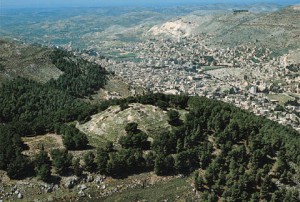Joshua 7-8 (Casting lots, Mt. Ebal)
Uh oh, there's a lot to cover here. We'd better jump right into it.
When last we left our hero (as my old O.T. professor always likes to say), Joshua has successfully destroyed the city of Jericho and now has his eye set on its neighbor, Ai.
7:2. And Joshua sent men from Jericho, to Ai, which is beside Beth-aven, on the east side of Beth-el, and spoke to them saying, Go up and spy out the land. And the men went up and spied out Ai.
7:3. And they returned to Joshua, and said to him, Do not let all the people go up; but let about two or three thousand men go up and smite Ai; do not trouble all the people there; for they are but few.
We're starting to get a sense of Joshua's M.O. here: always start by sending spies to check out the enemy's defenses.
In this case, the spies' report is meant to make the Israelites' upcoming defeat even more humiliating. The town of Ai is not a tough target. Joshua shouldn't need to send more than a sliver of his army to take it.
- And the men of Ai smote of them about thirty-six men; and they chased them from before the gate to Shebarim, and smote them in the descent; and the hearts of the people melted, and became as water.
The men of Ai whup the ever-loving bejeezus out of Joshua's men, chasing them all the way back down the hill (most cities were built on top of hills back then so that they could be more easily defended). Notice that despite suffering total defeat, the Israelite force of three thousand men only suffers thirty-six casualties.
There are several ways to explain that strangely low figure. First, you could just accept that war is a strange art and sometimes you get these results. For instance, in the famous Battle of Trenton, George Washington attacked 1,500 Hessian soldiers with 2,400 men, but only two American soldiers and twenty-two Hessians died in the fighting. Second, you could take this as evidence that the number of Israelites listed in the Bible is heavily inflated (which is true, as I've previously discussed), since thirty-six is only a realistic number of deaths if there were far fewer participants.
7.1. And the children of Israel committed a trespass in the consecrated thing, for Achan the son of Carmi, the son of Zabdi, the son of Zerah, of the tribe of Judah, took of the consecrated thing; and the anger of the Lord was kindled against the children of Israel. (Joshua 7.1)
Notice the collectivist mindset of the ancients here: one soldier angers the LORD by taking home some of the nice things the Israelites find in Jericho, but this verse accuses all of "the children of Israel" - and an apparently like-minded God punishes the entire army. The sin of the individual is the sin of the community. You are indeed your brother's keeper.
7.14. [God says:] In the morning, therefore, you shall be brought near according to your tribes; and it shall be, that the tribe which the Lord takes shall come near by families; and the family which the Lord takes shall come near by households; and the household which the Lord takes shall come near man by man.
This is a very unclear verse, perhaps purposefully so; a later redactor of the text might have been embarrassed by the method which the Israelites use here and purposefully obscured it. What happens is that the priests cast lots - basically, roll dice - in order to figure out who is guilty. Probably they are specifically using Urimm and Thummim a holy pair of divination stones in the possession of the high priest. These particular stones are the Israelites' primary means of communicating with God after Moses dies: Joshua asks what he should do next and the high priest pulls out the stones to find out.
So: first the high priest rolls to see which tribe is at fault (Judah), then he rolls to see which family of that tribe is at fault (the Zarhites), then he rolls to see which household in that family is at fault (Zabdi), and finally he rolls to see which of Zabdi's people is at fault (Achan, Zabdi's grandson), after which Achan (whose name basically means "trouble-maker") confesses.
If this doesn't sound very different from seeking the advice of someone who gazes into crystal balls or reads tea leaves, well, let's face it: it's not.
7:25. And Joshua said, Why have you troubled us? The Lord shall trouble you this day. And all Israel stoned him with stones, and burned them with fire, [after] they [had] stoned them with stones.
A friend (actually he's more of an enemy, but we keep in touch) who has visited Israel and who majored in Religion tells me that the Hebrews usually didn't throw rocks at somebody until they died; that might take too long. Instead they brought the criminal to a cliff and then stoned him until he fell. Since the tribesmen of Judah (which wrote most of the Tanakh) mainly lived in the mountains, they had plenty of cliffs available.
I'm going to skip most of chapter 8 because while it's fun stuff, it's also pretty self-explanatory. God is happy with Israel again, so Joshua conquers Ai, and this time everyone keeps their hands in their pockets.
8:30. Then Joshua built an altar to the Lord God of Israel on Mount Ebal.
8:31. As Moses, the servant of the Lord, commanded the children of Israel, as it is written in the book of the law of Moses, an altar of whole stones, upon which no (man) has lifted up any iron. And they offered upon it burnt-offerings to the Lord and sacrificed peace-offerings.
8:32. And he wrote there upon the stones a copy of the law of Moses, which he wrote in the presence of the children of Israel.
8:33. And all Israel, and their elders and officers and their judges, stood on this side of the Ark and on that side, before the priests the Levites, the bearers of the Ark of the covenant of the Lord, the stranger as well as the native born, half of them over against Mount Gerizim and half of them over against Mount Ebal, as Moses the servant of the Lord had commanded, to bless the people of Israel first.
8:34. And afterward he read all the words of the law, the blessing and the curse, according to all that is written in the book of the Torah.
This scene may seem familiar to you. In the Book of Deuteronomy, a still-living Moses orders the people of Israel to perform this ritual after they enter the Promised Land. The Book of Joshua's record of the people doing so is actually considered the older account by scholars, however; that is, the story of the Israelities performing the ritual is older than the story of Moses telling them to do it.
Both stories may actually be incorrect, though. The Samaritan version of the Torah says that Mount Gerizim - the other mountain that the tribes stand on - is the original site of the altar, as well as the place God has truly designed for His worship. This disagreement may be why both mountains are used, but blessings are pronounced from Ebal and curses from Gerizim: the writers of Dueteronomy and Jonah, southerners who would have disagreed with the Samarians, are trying to bring northern and southern Hebrews together while still subtly asserting their chosen mountain's superiority.
Here's a picture of both Ebal and Gerizim:
On the archaeology side of things, a structure which may well be an altar has been discovered on Mount Ebal. The only problem is it's facing the wrong direction - away from Mount Gerizim, north instead of south. Wikipedia says that "the excavating archaeologist proposed that this could be resolved by identifying a mountain to the north as Gerizim rather than the usual location, [but] the suggestion was ridiculed by both the Samaritans, who found it offensive to move the centre of their religion, and by other scholars and archaeologists."
So take from all that what you will.
Fin.
As usual, all Biblical quotations are from the Tanach published by Judaica Press, courtesy of Chabad.org.
OTHER POSTS IN THIS SERIES: Joshua 5-6 Joshua 2-4 Joshua 1
This entry was tagged. Bible Commentary Joshua

